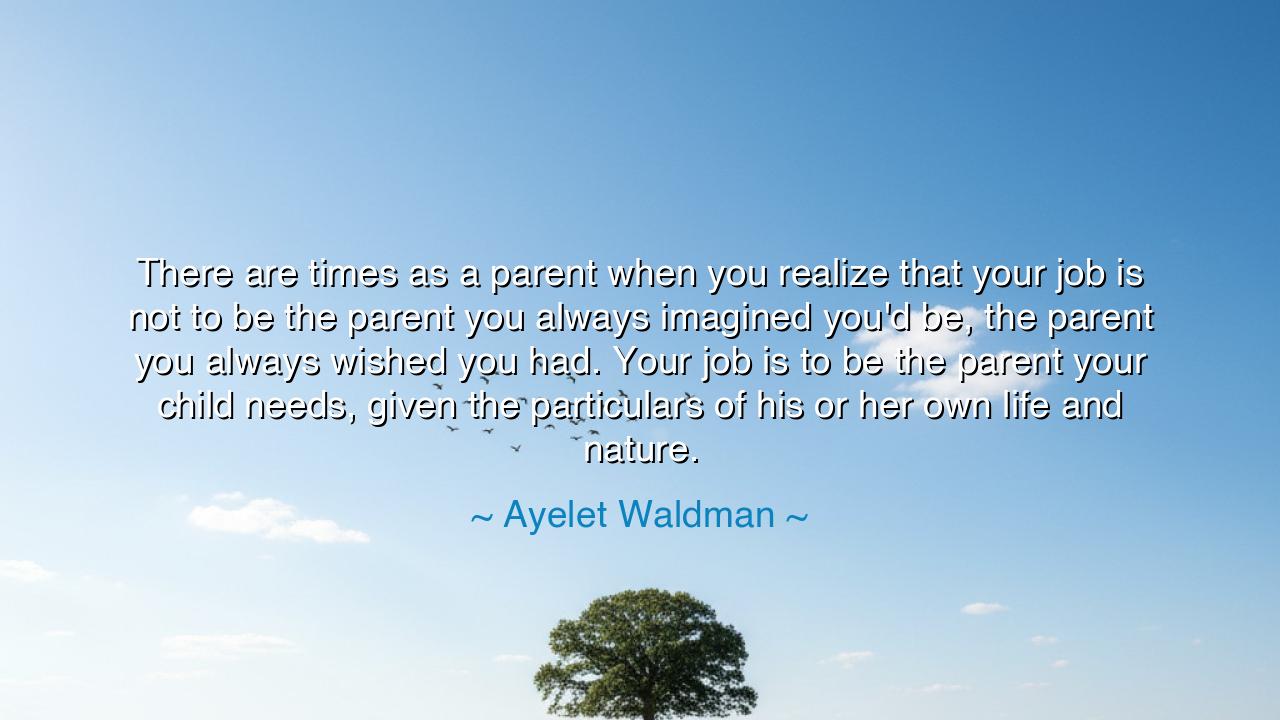
There are times as a parent when you realize that your job is
There are times as a parent when you realize that your job is not to be the parent you always imagined you'd be, the parent you always wished you had. Your job is to be the parent your child needs, given the particulars of his or her own life and nature.






The words of Ayelet Waldman—“There are times as a parent when you realize that your job is not to be the parent you always imagined you'd be, the parent you always wished you had. Your job is to be the parent your child needs, given the particulars of his or her own life and nature.”—shine with the wisdom of lived struggle. They pierce the illusion that parenting is merely the fulfillment of an ideal or the correction of one’s own childhood wounds. Instead, they proclaim a harder and holier truth: that the task of parenting is not to create a fantasy, but to respond with courage and humility to the reality of the child before you.
The ancients knew this lesson well. In the writings of Aristotle, it is said that education must fit the nature of the student, not the dream of the teacher. A shepherd does not command the flock to walk the same path each day, but guides each according to terrain, weather, and circumstance. So too, a parent must see not only the shape of their own longings, but the unique contours of their child’s soul. The parent imagined may be noble, but the parent required is greater still.
History gives us examples both radiant and tragic. Consider the tale of King Philip II of Macedon and his son, Alexander. Philip sought to shape his son into a warrior-king in his own image. Yet he also had the wisdom to give him Aristotle as a tutor, knowing that Alexander’s restless brilliance required more than the sword. In this blend—discipline for the body and philosophy for the mind—Alexander became not only a conqueror but a visionary, carrying Greek culture to distant lands. Had Philip insisted only on molding Alexander into the father he himself wished to be, the world might never have known Alexander the Great.
Contrast this with the many tales of rulers who demanded their children conform to rigid expectations. History remembers princes broken under the crushing weight of a father’s unyielding dream, or daughters silenced because their gifts did not match what was desired of them. In such cases, the parents clung to the fantasy of the parent they wished to be, and in so doing, they lost sight of the child they had. This blindness brings not legacy, but sorrow.
Waldman’s words remind us that every child is a mystery, carrying within them strengths, weaknesses, passions, and fears that no parent can predict. A child may be quiet when the parent dreamed of boldness, tender when the parent longed for toughness, artistic when the parent hoped for practical skill. The wise parent releases their imagined role and instead listens, adapts, and serves. In this humility lies true strength. To parent well is not to act out a script, but to answer a living, ever-changing call.
The lesson is clear: see your child as they are, not as you dreamed they would be. Love them for their nature, not your nostalgia. Do not force your story upon them, but help them write their own. Parenting, then, becomes an act of service rather than performance, a devotion to the child’s becoming rather than the parent’s self-image. In this way, the family becomes not a prison of expectations but a sanctuary of growth.
Therefore, let your actions be these: listen with patience to the soul of your child. Adjust your discipline and your love to their needs, not to your fantasies. Release the burden of being the parent you wished for, and take up the higher calling of being the parent your child requires. This is harder, for it asks you to surrender ego, but it is also nobler, for it creates a bond of truth rather than illusion.
Thus, Ayelet Waldman’s words stand as an eternal reminder: good parenting is not about fulfilling dreams of the past, but about meeting the needs of the present child. In abandoning illusion, parents find reality; in surrendering fantasy, they find truth. And in truth, both parent and child are transformed—each made stronger, each made freer, each made more fully human.






AAdministratorAdministrator
Welcome, honored guests. Please leave a comment, we will respond soon